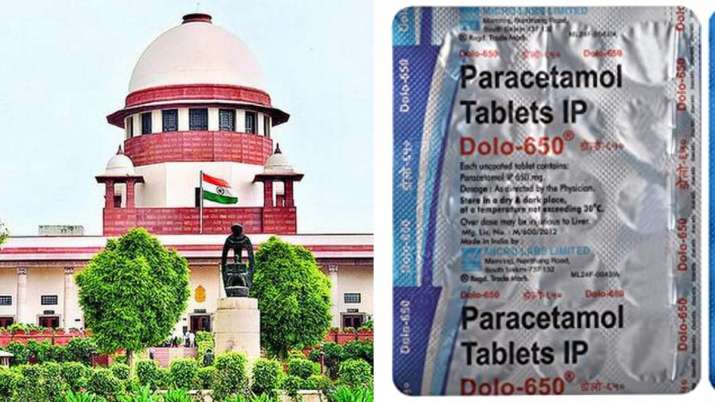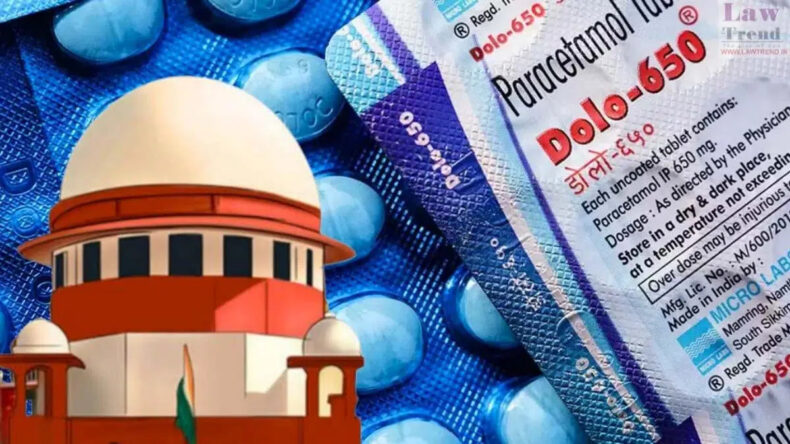SCAM : ‘Dolo-650 makers spent Rs 1,000 cr on docs for prescribing drug’: SC asks Centre to file a response
The Central Board for Direct Taxes (CBDT) has accused makers of the Dolo-650 tablet of distributing freebies worth Rs 1,000 crore to doctors as consideration for prescribing the tablet, said senior advocate Sanjay Parikh, appearing for the Federation of Medical and Sales Representatives Association of India.

The Supreme Court expressed concern today about alleged unethical marketing practices by pharmaceutical companies that lead to healthcare professionals prescribing high-cost or overpriced brands. The Supreme Court was hearing a public interest litigation (PIL) seeking orders holding pharmaceutical companies accountable for providing freebies to doctors as an inducement to prescribe their drugs.
The Supreme Court bench of Justices DY Chandrachud and AS Bopanna was informed that the makers of the popular anti-fever drug Dolo-650 mg tablet had spent Rs 1,000 crore on freebies in order to get their medicine prescribed to patients.
The Central Board of Direct Taxes (CBDT) has accused the makers of the Dolo-650 tablet of distributing freebies worth Rs 1,000 crore to doctors in exchange for prescribing the tablet, said senior advocate Sanjay Parikh, appearing for the Federation of Medical and Sales Representatives Association of India.
Justice DY Chandrachud described it as a “severe issue” and mentioned that when he had Covid, the same medication had also been prescribed to him.
“I don’t find this to be relaxing. When I had COVID, I was also asked to have the same. This is a very severe thing, “said Justice Chandrachud.
The Center has been given 10 days by the court to submit a response.
According to the PIL, there are several cases that demonstrate how corruption in the pharmaceutical industry jeopardizes patients’ health and threatens positive health outcomes.
The petition has stated several examples of how corruption in the pharmaceutical industry jeopardizes positive health outcomes and endangers people. There are several examples of how corruption in the pharmaceutical industry jeopardizes positive health outcomes and endangers people’s health.
It further stated that a Statutory Code of ethical marketing for the Pharmaceutical Industry, with Penal Consequences, be established to curtail such practises for the enforcement of the Fundamental Right to Health of the people of India since violations of this kind have become a recurring phenomenon and are progressively becoming more widespread.
The petition also claimed that since the current Code is voluntary, unethical behaviour has increased and been exposed throughout the COVID-19 period.
In order to make the Uniform Code of Pharmaceutical Marketing Practices effective by providing a monitoring mechanism, transparency, accountability, and consequences for infractions, the petition urged to issue a directive.
The Dolo-650 makers have spent Rs 1,000 crore on doctors for prescribing the drug. Is it a marketing strategy or a scam ?
The Central Board of Direct Taxes has accused the pharmaceutical company manufacturing popular Dolo-650 mg tablets of distributing Rs 1,000-crore freebies to doctors for prescribing the anti-inflammatory, fever-reducing drug to patients, the Supreme Court was told on Thursday.
Senior advocate Sanjay Parikh told a Bench led by Justice DY Chandrachud on behalf of petitioner Federation of Medical and Sales Representatives Association of India that the market price of any tablet up to 500 mg was regulated under price control mechanism but the price of tablets above 500mg could be fixed by pharma companies.
To ensure a higher profit margin, the drug manufacturer distributed freebies to doctors to prescribe the Dolo-650 mg, Parikh said, adding it’s an “irrational dose combination”. “What you are saying is not music to my ears. This is exactly the drug that I had when I had Covid recently. This is a serious issue and we will look into it,” Justice Chandrachud said. The Bench asked Additional Solicitor General KM Nataraj to file his response in 10 days and posted the matter for further hearing on September 29.
It also gave a week thereafter to Parikh to file his rejoinder after the senior counsel said that he would like to bring more such facts to the knowledge of the court. The petition sought directions to the Centre for formulating a uniform code of pharmaceutical marketing practices to curb unethical practices.
Source :













